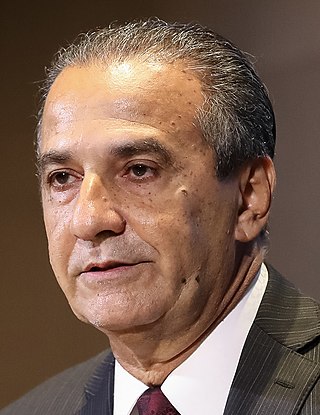Pentecostalism or classical Pentecostalism is a Protestant Charismatic Christian movement that emphasizes direct personal experience of God through baptism with the Holy Spirit. The term Pentecostal is derived from Pentecost, an event that commemorates the descent of the Holy Spirit upon the Apostles and other followers of Jesus Christ while they were in Jerusalem celebrating the Feast of Weeks, as described in the Acts of the Apostles.

The World Assemblies of God Fellowship (WAGF) is a global cooperative body of over 170 Pentecostal denominations that was established on August 15, 1989. WAGF was created to provide structure so that member denominations, which previously related to each other informally, could more easily cooperate on a global basis.
The God is Love Pentecostal Church (IPDA) is a Pentecostal trinitarian Christian denomination in Brazil. The headquarters are in São Paulo.

The predominant religion in Brazil is Christianity, with Catholicism being its largest denomination.

Leme is a municipality in the state of São Paulo in Brazil. The population is 104,346 in an area of 403 km². At the 2000 census, it had 80,757 residents, 40,830 of whom are men and 39,927 women. 65,885 residents are 10 years old or older, and of these, 59,991, or 91.1%, are literate. Leme officially became a town on August 29, 1895. The municipality is formed by the main district and also includes the rural neighborhoods Taquari, Taquari Ponte and Caju.
The Universal Church of the Kingdom of God is an international Evangelical Neo-charismatic Christian denomination with its headquarters at the Temple of Solomon in São Paulo, Brazil. The church was founded in 1977 in Rio de Janeiro by Bishop Edir Macedo, who is the owner of the multi-billion television company RecordTV.

The Brazilian Catholic Church, or Catholic Church in Brazil, is part of the worldwide Catholic Church, under the spiritual leadership of the Pope in Rome, and the influential National Conference of Bishops of Brazil, composed of over 400 primary and auxiliary bishops and archbishops. There are over 250 dioceses and other territorial jurisdictions in Brazil. The primate of Brazil is Dom Sérgio da Rocha.

The Assembleias de Deus are a Pentecostal church in Brazil founded by Daniel Berg and Gunnar Vingren, who came to Brazil as missionaries from the Swedish Pentecostal movement. The Assembleias de Deus are related to the worldwide Pentecostal movement, and some groups are affiliated with the Assemblies of God.

Cordeirópolis is a municipality in São Paulo state, Brazil. The population is 24,826 in an area of 138 km2. Its elevation is 651 m.
Reborn in Christ Church is an Evangelical Christian denomination headquartered in São Paulo, Brazil. The church was founded in 1986 by the couple Apostle Estevam Hernandes and Bishop Sônia Hernandes.

Protestantism in Brazil began in the 19th century and grew in the 20th century. The 2010 census reported that 22.2% of the Brazilian population was Protestant, while in 2020 the percentage was estimated to have risen to 31% of the population, over 65 million individuals, making it the second largest Protestant population in the Western world. Another 2020 study from the Association of Religion Data Archives estimated that Brazil's Protestant population was 15.12%.
The Adventist Church of Promise is an evangelical Christian denomination which is both Sabbatarian Adventist and classical Pentecostal in its doctrine and worship. It was founded in Brazil in 1932 by pastor John August Silveira, as a split-off from the Seventh-day Adventist Church.

The Presbyterian Church of Brazil is an Evangelical Protestant Christian denomination in Brazil. It is the largest Presbyterian denomination in the country, having an estimate 702,949 members, 4,915 ordained ministers and 5,420 churches and parishes. It is also the only Presbyterian denomination in Brazil present in all 26 States and the Federal District.

Silas Lima Malafaia is a Brazilian Pentecostal pastor, author and televangelist, who also has a degree in Psychology. He is the leader of the Pentecostal church Assembleia de Deus Vitória em Cristo, a branch of the broader Assembleias de Deus movement of Pentecostal churches in Brazil. He is also the CEO of the Central Gospel Music publishing company, and vice president of the Interdenominational Council of Evangelical Ministers of Brazil (CIMEB), which is made up of approximately 8.500 ministers and leaders from almost all Brazilian evangelical denominations.

The Independent Presbyterian Church of Brazil is a Mainline Protestant Christian denomination in Brazil. Part of the Reformed family of Protestantism, it is the second oldest Presbyterian denomination in the country, had an estimated 74.224 members, 693 ordained ministers and 510 churches in 2009. In 2012 the church had more than 85,000 members and 546 congregations. It was founded by Brazilian minister Rev. Eduardo Carlos Pereira and a group of six other ministers and their churches, who split from the Presbyterian Church of Brazil over a number of political and ecclesiastical controversies.
The Renewed Presbyterian Church in Brazil is Presbyterian Pentecostal denomination in Brazil.
Pentecostalism is the fastest-growing Christian denomination in Brazil. Pentecostalism has surged since the 1990s while the largest denomination, Roman Catholicism, has undergone a decline. At some points, churches were appearing as rapidly as one church per day. Pentecostalism in Brazil traces its roots to the Azusa Street Revival in 1906 in Los Angeles and, like Pentecostal movements in other countries, emphasizes a second act of grace following conversion that results in gifts of the Spirit such as glossolalia and healing.
Charismatic Christianity is a form of Christianity that emphasizes the work of the Holy Spirit and spiritual gifts as an everyday part of a believer's life. It has a global presence in the Christian community. Practitioners are often called charismatic Christians or renewalists. Although there is considerable overlap, charismatic Christianity is often categorized into three separate groups: Pentecostalism, the Charismatic movement, and the neo-charismatic movement.
The Presbyterian Church of Grace is a denomination of orientation Pentecostal, founded on October 8, 1995, in Mogi das Cruzes, São Paulo from a group of dissident members of the Presbyterian Church of Brazil, who adhered to the Pentecostal doctrine of Baptism with the Holy Spirit as the second blessing, after conversion. Despite adopting the Presbyterian name, it has no link with the doctrine Presbyterian, nor with the Presbyterian form of government, being the Episcopalism adopted.

Roberto de Lucena is a Brazilian politician as well as a writer and pastor. He has spent his political career representing São Paulo, having served as federal deputy representative since 2011.










